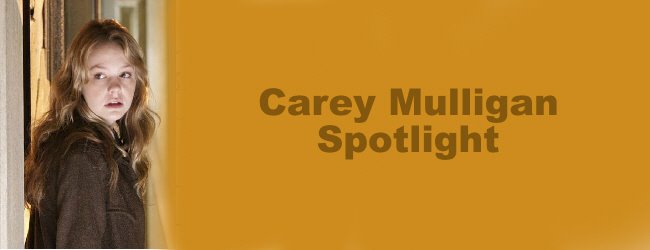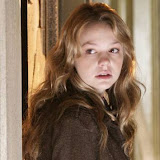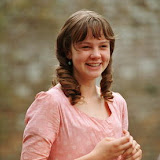Sorry for taking over 10 months to update this page but here is all the news relating the Carey over this time
Wednesday, 13 February 2008
'Northanger Abbey' is lighthearted Austen
'Northanger Abbey' is lighthearted Austen
By Matthew Gilbert, Globe Staff | January 19, 2008
This new PBS adaptation of Jane Austen's "Northanger Abbey," tomorrow at 9 p.m. on Channel 2, was written by Andrew Davies. If you're a fan of filmed classic novels, you've probably already admired Davies' work as the screenwriter of some of PBS's best "Masterpiece Theatre" productions - "Bleak House," "Middlemarch," "The Way We Live Now," and the "Pride and Prejudice" - that would be the 1995 version starring Jennifer Ehle and Colin Firth, with all due respect to Sir Laurence O.
Davies has a pleasing way of staying true to his masterful sources in spirit and detail, never imposing a contemporary vision onto them in the way Jane Campion and Laura Jones did in 1996 with "The Portrait of a Lady," by making the Henry James novel into a tale of domestic abuse. And yet Davies knows how to clear off the dust, too, to translate all the 19th-century manners and obscurities for today's audiences. There's a nice scene early in "Northanger Abbey" when heroine Catherine Morland and hero Henry Tilney are talking about flirting while flirting, and Davies makes their clever "meta" exchange - talking about talking - feel like a Victorian invention.
There are things to like about Davies' "Northanger Abbey," even while it is flawed and superficial, particularly when the storyline collapses awkwardly toward the end. It is not one of Davies' most consistent adaptations, but still, it's an easy-to-watch introduction to one of Austen's lesser-known novels. Austen wrote "Northanger Abbey" early in her career but, after a publishing misadventure, it was not released until after her death. About an imaginative young woman who reads too many Gothic novels, the story is Austen's most lighthearted.
Catherine Moreland (Felicity Jones), an impressionable 17-year-old from a large, not particularly wealthy family, is brought into Bath leisure society by family friends. There she meets two very different pairs of siblings. Isabella Thorpe (Carey Mulligan) and John Thorpe (William Beck) are lively and, perhaps, scheming. Eleanor Tilney (Catherine Walker) and Henry Tilney (JJ Feild) are quieter, more mysterious, and more dignified. Having only learned about life through heightened, supernatural novels, Catherine is ill-equipped to parse out the good and the bad in the Thorpes and the Tilneys.
The movie gives us black-and white flashes of Catherine's vivid fantasies - scenarios in which she is captured by thieves, Henry rescues her, and she swoons in quasi-sexual ecstasy and fear. In the novel, Austen is teasing Catherine, and Davies carries that gently mocking tone into the movie through an authorial voiceover that musingly tells us, "Something must and will happen to throw adventure in her way."
At one point while staying with the Tilneys at their large home, Northanger Abbey, Catherine imagines that their father, a stiff general, was in some way responsible for the death of their late mother. Swept up in her sense of drama, she shares her theory with Henry and appears to trigger a series of unpleasant events. By that moment, though, the movie has already given up on its storytelling efforts and on making the secondary characters anything more than sketches. Davies and director Jon Jones seem to be saying, "OK, you know where this is all going, so let's just go there. You've seen an Austen movie, that's good enough."
Part of "The Complete Jane Austen" presented by "Masterpiece" this season, "Northanger Abbey" probably needs more than 90 minutes to do justice to Austen's novel. While it is a fairly obvious piece of work, in that the perceptions of characters generally match their realities, the story still deserves enough time to explore more thoroughly how the Thorpes' behavior affects our heroine, and how our heroine grows. As she learns not to be so easily influenced by others and by books, we need to know more about the allure of those influences.
Matthew Gilbert can be reached at gilbert@globe.com.
http://www.boston.com/ae/tv/articles/2008/01/19/northanger_abbey_is_lighthearted_austen/
By Matthew Gilbert, Globe Staff | January 19, 2008
This new PBS adaptation of Jane Austen's "Northanger Abbey," tomorrow at 9 p.m. on Channel 2, was written by Andrew Davies. If you're a fan of filmed classic novels, you've probably already admired Davies' work as the screenwriter of some of PBS's best "Masterpiece Theatre" productions - "Bleak House," "Middlemarch," "The Way We Live Now," and the "Pride and Prejudice" - that would be the 1995 version starring Jennifer Ehle and Colin Firth, with all due respect to Sir Laurence O.
Davies has a pleasing way of staying true to his masterful sources in spirit and detail, never imposing a contemporary vision onto them in the way Jane Campion and Laura Jones did in 1996 with "The Portrait of a Lady," by making the Henry James novel into a tale of domestic abuse. And yet Davies knows how to clear off the dust, too, to translate all the 19th-century manners and obscurities for today's audiences. There's a nice scene early in "Northanger Abbey" when heroine Catherine Morland and hero Henry Tilney are talking about flirting while flirting, and Davies makes their clever "meta" exchange - talking about talking - feel like a Victorian invention.
There are things to like about Davies' "Northanger Abbey," even while it is flawed and superficial, particularly when the storyline collapses awkwardly toward the end. It is not one of Davies' most consistent adaptations, but still, it's an easy-to-watch introduction to one of Austen's lesser-known novels. Austen wrote "Northanger Abbey" early in her career but, after a publishing misadventure, it was not released until after her death. About an imaginative young woman who reads too many Gothic novels, the story is Austen's most lighthearted.
Catherine Moreland (Felicity Jones), an impressionable 17-year-old from a large, not particularly wealthy family, is brought into Bath leisure society by family friends. There she meets two very different pairs of siblings. Isabella Thorpe (Carey Mulligan) and John Thorpe (William Beck) are lively and, perhaps, scheming. Eleanor Tilney (Catherine Walker) and Henry Tilney (JJ Feild) are quieter, more mysterious, and more dignified. Having only learned about life through heightened, supernatural novels, Catherine is ill-equipped to parse out the good and the bad in the Thorpes and the Tilneys.
The movie gives us black-and white flashes of Catherine's vivid fantasies - scenarios in which she is captured by thieves, Henry rescues her, and she swoons in quasi-sexual ecstasy and fear. In the novel, Austen is teasing Catherine, and Davies carries that gently mocking tone into the movie through an authorial voiceover that musingly tells us, "Something must and will happen to throw adventure in her way."
At one point while staying with the Tilneys at their large home, Northanger Abbey, Catherine imagines that their father, a stiff general, was in some way responsible for the death of their late mother. Swept up in her sense of drama, she shares her theory with Henry and appears to trigger a series of unpleasant events. By that moment, though, the movie has already given up on its storytelling efforts and on making the secondary characters anything more than sketches. Davies and director Jon Jones seem to be saying, "OK, you know where this is all going, so let's just go there. You've seen an Austen movie, that's good enough."
Part of "The Complete Jane Austen" presented by "Masterpiece" this season, "Northanger Abbey" probably needs more than 90 minutes to do justice to Austen's novel. While it is a fairly obvious piece of work, in that the perceptions of characters generally match their realities, the story still deserves enough time to explore more thoroughly how the Thorpes' behavior affects our heroine, and how our heroine grows. As she learns not to be so easily influenced by others and by books, we need to know more about the allure of those influences.
Matthew Gilbert can be reached at gilbert@globe.com.
http://www.boston.com/ae/tv/articles/2008/01/19/northanger_abbey_is_lighthearted_austen/
Subscribe to:
Post Comments (Atom)



1 comment:
An ideal activity after watching Northanger Abbey is visiting Bath and treating it as a literary tour complementing the book/movie.
Post a Comment